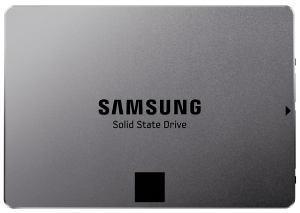

Model: Samsung SSD 840 EVO Series 750GB Solid State Drive
Manufacturer: Samsung Electronics
Provided By: Samsung America
Samsung Electronics has been a leader in the electronics industry for more than 30 years. Since the introduction of their first television in 1970, this Korean company has grown to become one of the world's leading electronics manufacturers, offering everything from tiny semiconductors to large home appliances. Samsung is no stranger to the storage industry either. Along with an assortment of DVD and Blu-ray Disc drives, the company offers both hard drive and flash based storage solutions for the portable and desktop computer markets
Like many other manufacturers, Samsung has set its sights on the growing solid-state drive (SSD) market. Last fall, the company introduced its 840 Series SSDs. Designed and built completely in-house, the SSD 840 and SSD 840 Pro were powered by Samsung's own triple-core MDX controller and featured a SATA 6GB/s interface, specially-engineered wear-leveling and garbage collection algorithms and up to 512MB of cache. The main difference between the two was that the SSD 840 used Samsung's new 3-bit/cell MLC NAND, which is often referred to as TLC NAND. This high-density NAND was more affordable than the 2-bit/cell MLC NAND found in the SSD 840 Pro, but there was a bit of a trade off in regards to endurance (program/erase cycles) and performance.
Samsung has now launched the SSD 840 EVO. Unveiled at the company's annual SSD Global Summit, the drive is powered by Samsung's new MEX controller that is faster, yet more energy efficient, than the MDX controller found in the SSD 840 and SSD 840 Pro. The SSD 840 EVO is also available with up to 1TB of Samsung's second generation 3-bit/cell MLC NAND. To overcome the slow write speeds typically associated with this type of NAND flash, Samsung has increased the size the DRAM cache and implemented an innovative write acceleration algorithm called TurboWrite, which creates a high-performance write buffer in the SSD. Along with TurboWrite, the SSD 840 EVO supports Samsung's new RAPID (Real-time Accelerated Processing of I/O Data) technology. By using free PC memory as a cache, RAPID can push the performance of the SSD beyond the limits of the current SATA specification.

The SSD 840 EVO is available in a wide range of capacities from 120GB up to a massive 1TB. For this review, Samsung sent us the 750GB version of the drive which is capable of delivering up to 540 MB/s sequential read and 520 MB/s sequential write speeds as well as up to 98,000 random read and 90,000 random write IOPS.
| Samsung SSD 840 EVO Series 750GB Solid State Drive | |||||||||||||||||||||||||||||||||||||||||||||||||
General Specifications
Performance
Reliability
Power Consumption
Environmental
Dimensions and Weight
Other Features
|
Needless to say, this is only a taste of what the SSD 840 EVO has to offer. To give you an idea of what to expect, we'll take a closer look at Samsung's new SSD and then see how well it performs. Does the SSD 840 EVO have what it takes? Can it deliver the performance and features that we've come to expect from Samsung? Keep reading as we find out.

